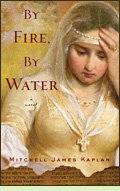|
By Fire, By Waterby Mitchell James KaplanReviewed by Margaret Donsbach Besides Santángel, the novel offers the viewpoints of a beautiful Jewish woman, Torquemada, and various characters who either carry out the Inquisition's dirty work or suffer its effects. The climax is the eventful year 1492, which saw the reconquest of Granada, the expulsion of the Jews from Spain, and the authorization of Columbus's westward voyage in search of the Indies, along with the the Inquisition's intensified effort to root out conversos suspected of secretly practicing Judaism. A result of the novel's huge scope is a tendency to skim the surface of events. Santángel does not bring readers into the political center of the Spanish court but remains on its periphery. His romance with Judith, the beautiful Jewish silversmith, never quite gels, and his relationship with his son is too distant to arouse truly gripping suspense when the Inquisition takes the boy into custody. Finally, Santángel's lack of faith in himself and his ability to make a difference makes him a less than dynamic character. As Judith says, "Even the most powerful of us, we have little control over our destiny." If By Fire, By Water never becomes deeply moving, though, it's not from lack of realism. It avoids errors like the old chestnut about Columbus startling people by claiming the world was round; his contemporaries were well aware that it was but questioned whether it was small enough for the Indies to be where Columbus thought they were. Readers may also be surprised to learn that Torquemada's approach aroused controversy within the Church. The novel's fresh, research-based approach makes it a worthwhile fictional introduction to the era. (2010; 284 pages, including an Author's Note separating history from fiction) More about By Fire, By Water at Powell's Books or Amazon.com
Kabbalah of Stone by Irene Reti (2009), about the spirit of an Old Testament prophetess and a young man from a converso family in 1491 Spain, on the eve of the expulsion of the Jews. Review or More info from Amazon.com Crown of Aloes by Norah Lofts (1973), about Queen Isabella of Spain. More info The Life and Voyages of Christopher Columbus by Washington Irving (1828), a major source of the persistent but erroneous belief that it was Columbus who convinced Europeans the earth was not flat but round. More info
1492: The Year the World Began by Felipe Fernandez Armesto (2009). More info Jews of Spain: A History of the Sephardic Experience by Jane S. Gerber (1992). More info The Origins of the Inquisition in Fifteenth-Century Spain by B. Netanyahu (1995). More info Admiral of the Ocean Sea: A Life of Christopher Columbus by Samuel Eliot Morison (1942), the Pulitzer Prize-winning 1942 biography. More info The Conquest of Paradise: Christopher Columbus and the Columbian Legacy by Kirkpatrick Sale (1990), a reassessment of Columbus that brings to light some of the less flattering aspects of Columbus and his legacy. More info
The Alhambra Decree expelling the Jews from Spain, in English translation Back to Medieval: 14th-15th Centuries
|
